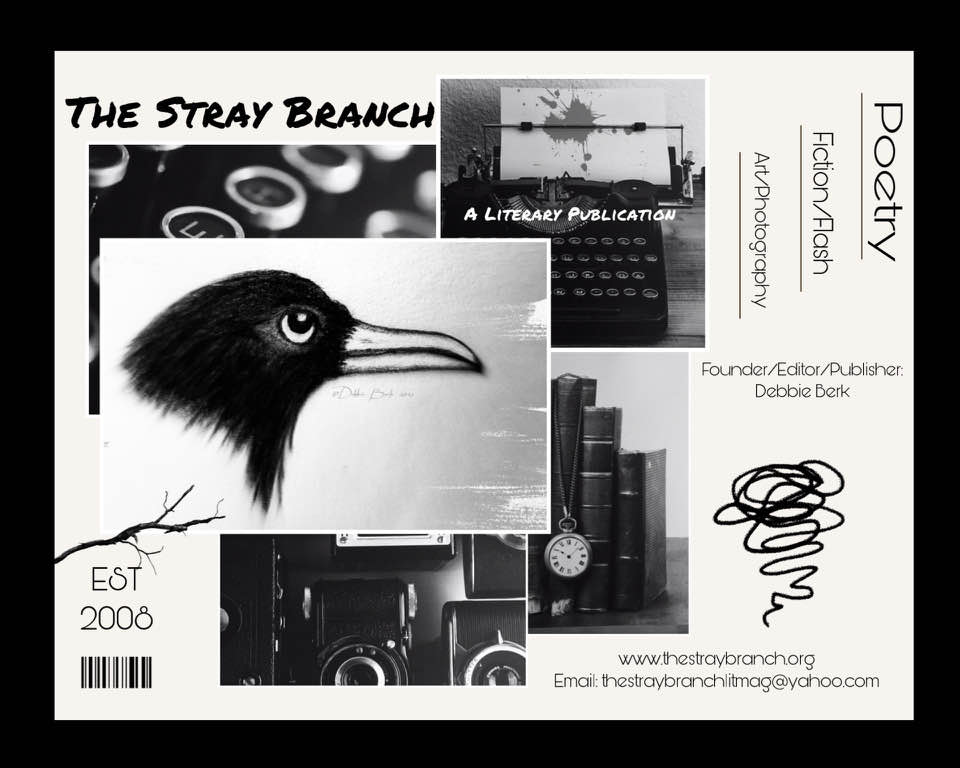Spring/Summer 2015

Mark Wagstaff was born by the sea and lives in London. He has had short stories published in print and online in the US and UK. Recent publications include in Scissors and Spackle, Cobalt and Tethered by Letters. In 2012 Mark won the Machigonne Fiction Contest, promoted by The New Guard of Portland, ME. His second short story collection will be published by InkTears in 2014 and his fifth novel is due to be published by Folded Word. www.markwagstaff.com
_________________________________________________________________________

Artwork, “Between The Lines” by Denny Marshall
Pirates and Ghosts
by Mark Wagstaff
In that email my boss opened a bracket he didn’t close. I searched the message –
everything after the opening bracket hung included by it. Everything: his name, the
signature block giving phone and web contacts, the automated reminder to think
before you print; and even beyond the cartoon tree giving two thumbs up, that
bracket didn’tclose. So it went on, through his next email and the executive papers
he authored, SMS to his wife, scribbled reminders on sticky notes to buy cheese
and pick up the kids. All his words wrenched in the slipstream of a bracket,
speeding toward the night.
I couldn’t sleep wondering where that comet might go. A rogue particle, the
bracket created conceptually by his decision to hedge certain words remained
intended; free to rattle loose, it delimited to captured dependents the dreams and
fears flowing along beside us, and – in swallowing – downplayed them. His
messages next day lay trapped in sub-narrative, parenthesized in the lengthening
stream ofwords bundled ahead of the opening bracket, now way back in some
other timezone.So should I take those messages seriously? Should I do anything
about them? They weren’t primary instructions: they were in brackets.
Searching his words for cues to action I noticed something changed. The
emails he used to send – plain blue Verdana ten point on white – were solid,
straightforward orders parceled-out the ways he thought prudent. But here below
the narrative, in a slew of aside and hearsay, words swarmed unhitched through
translucent fields beyond the flimsy backdrop, flip side of more respectable
messageslost from sight on the surface, as a diver – down with the jellies and
weeds – loses grip on the shore. Since the unclosed opening bracket, less-than
reliable thoughts, pirate versions of daylight concepts, mingled with remains
of plans, the wraiths of unprofitable maneuvers. His words now were everything
that might have happened and didn’t, everything gone awry or gathered dust.
Unofficial buccaneering choices – disallowed him right side of the message – all
swept and roiled with his many regrets, his snarled bad wishes.
I barely recognized my boss in this muttered commentary on unrealized
actions. He counterfeited legitimate propositions, twisted them up with some toxic
move, a poisoned deliction to betray anyone fool enough to fall for its whispered
advance. He dragged old grievances back and back: specters stripped of content
demanded hearing, like the old and serial litigants of insoluble complaints.
His deviousness, his grudges, the champion endurance of his spite had me watch
my colleagues in fear that, if they hadn’t noticed these words were in brackets,
they might take his messages at face, instead of as pirates and ghosts.
They might implement what he devised, spawning new strings of baffled
remorse.
Good medicine was close the bracket. Fearing his transparent vindictiveness
I tried in carefully-structured email mined with clause and sub-clause to get him
to slam the door.Risky – what if he left another open? – and ultimately failed:
he punctiliously matched each set of my parentheses with his own. Glumly I saw
in his replies my words now trapped in brackets.
I didn’t get the pleasure I’d always hoped, hitting Send on my resignation.
It solved nothing, the problem would remain. I could jump ship but the ship
went on capturing,corrupting more ideas. I didn’t explain, simply told him I felt
hollow and had to leave.Instantly he demanded I see him. But when I got to
his desk he wasn’t around, his chair half-swiveled across the pod as though
he’d gone in a rush. In keeping with all his bad practice he left his
screen unlocked.
This was my chance. A fresh email, addressed to my account, I typed
a closing bracket and – superstitious – a full stop. Hit Send and smiled as he
returned, flexing a newly-unfolded cardboard box.
With the directness of a natural problem-solver I told him my problems
were solved: Iwas now solid and filled as the toneless back wall of an email.
He said he was glad, that good health was to be treasured. He handed me the box.
It felt shiny. He told me that to quit in good health was absolutely the most I could
hope for. He said management appreciated my decision, adding (in brackets)
that it wasn’t a day too soon.
